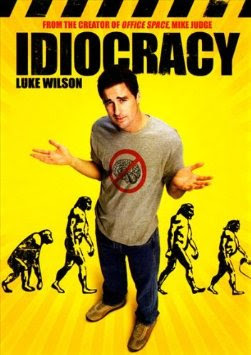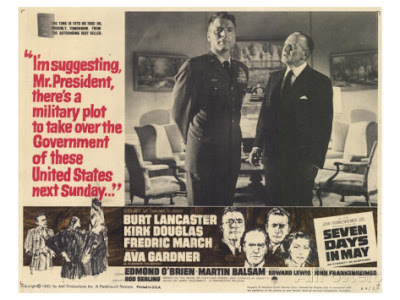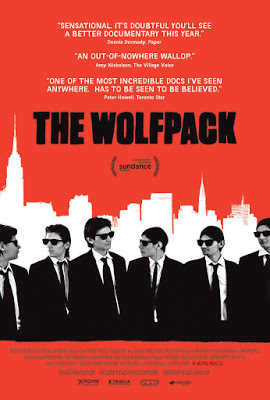Movies I Watched in March, Part 1
Hey, how about this? It's not even a week into April, and already I'm posting the first part of my March movie recap. It almost makes up for the lazy, lackluster posting I did in March (but not quite, not really). Anyway...

We watched this for the Out of Theaters podcast (listen to the ep here). Obviously, we chose it for its frightening proximity to actual current events, despite the fact that the movie is set 500 years in a dystopian future (and no, we’re not the only ones to make that observation). I admire the movie more and more each time I see it, both as a hilarious (and hilariously detailed) comedy and as an admirably dark look at where society might be headed (or might already have arrived at). Here’s a sample of what I wrote for the Out of Theaters post…
What makes “Idiocracy” work so well is its admirably obsessive attention to detail. The world of the future isn’t some generic setting where the story takes place — it’s a vivid, hilarious, unnervingly believable place where familiar name brands — Starbucks, Fuddruckers and Carl’s Jr., to name a few — become twisted version of their current counterparts, catering the worst urges of the public. (Yes, even worse than today.) Every location Joe stumbles into reflects the dangerous idiocy of the future, from the push-button hospitals to the zoo-like prisons to the White House itself, a run-down residence with a swimming pool on the lawn and holes in the walls to accommodate the poorly planned furniture placement. It’s funny, sure, funny as hell — but it’s a little hellish, too, the sort of place you wouldn’t want to be stuck in. And, in the sick joke at “Idiocracy’s” center, that’s how it is everywhere in the whole wide world.
Read the rest here.

I’ve seen “7 Days in May” plenty of times, and though I don’t think it’s quite the equal of director John Frankenheimer’s other conspiracy thriller, “The Manchurian Candidate,” I think it might actually be a bit more fun to watch. Rod Serling’s script about an attempted military coup of the United States by a square-jawed general (Burt Lancaster, perfectly cast) is full of big dramatic moments that provide its top-notch cast (Lancaster, Kirk Douglas, Fredric March, Ava Gardner, Edmund O’Brien, Martin Balsam) plenty of opportunities to chew the scenery – and it’s glorious to behold. Plus, Frankenheimer’s direction fits the story perfectly, establishing the corridors of power and their shadowy edges. What’s more, his TV experience comes in handy with the many TV screens and monitors scattered throughout – the movie is vaguely set in a time that’s in the future of its 1964 (but in the distant past, of course, of when we’re watching it now.)

Intriguing documentary about seven brothers who are held virtual prisoner in their tiny New York apartment by their weird dad and respond by become movie fans on a level few can even imagine, much less attain. Watching (and rewatching and rewatching…) movies like “Batman” and “Reservoir Dogs,” the transcribe them (via typewriter) then make their own home video versions, complete with surprisingly effective costumes and weaponry (made mostly with cardboard and electrical tape). The guys (with waist-length hair mandated by their dad’s wacko religious views) are likeable fellows, and watching them interact with each other and (eventually) the world outside is certainly entertaining, but I would’ve like “The Wolfpack” more if director Crystal Moselle had gone into a little more detail about the specifics of their situation: Wasn’t there more conflict between them and their dad? How did they afford all this … in Manhattan? What is the story with their sister? Sure, most of these questions could be answered with a little Googling, but isn’t the point of a documentary to deliver the necessary information. It’s a good movie, don’t get me wrong, but with a little more work, it could have been a great one. Still, highly recommended, especially if you’re a movie fan.
Coming up next: Three very different movies about the youth of America

We watched this for the Out of Theaters podcast (listen to the ep here). Obviously, we chose it for its frightening proximity to actual current events, despite the fact that the movie is set 500 years in a dystopian future (and no, we’re not the only ones to make that observation). I admire the movie more and more each time I see it, both as a hilarious (and hilariously detailed) comedy and as an admirably dark look at where society might be headed (or might already have arrived at). Here’s a sample of what I wrote for the Out of Theaters post…
What makes “Idiocracy” work so well is its admirably obsessive attention to detail. The world of the future isn’t some generic setting where the story takes place — it’s a vivid, hilarious, unnervingly believable place where familiar name brands — Starbucks, Fuddruckers and Carl’s Jr., to name a few — become twisted version of their current counterparts, catering the worst urges of the public. (Yes, even worse than today.) Every location Joe stumbles into reflects the dangerous idiocy of the future, from the push-button hospitals to the zoo-like prisons to the White House itself, a run-down residence with a swimming pool on the lawn and holes in the walls to accommodate the poorly planned furniture placement. It’s funny, sure, funny as hell — but it’s a little hellish, too, the sort of place you wouldn’t want to be stuck in. And, in the sick joke at “Idiocracy’s” center, that’s how it is everywhere in the whole wide world.
Read the rest here.

I’ve seen “7 Days in May” plenty of times, and though I don’t think it’s quite the equal of director John Frankenheimer’s other conspiracy thriller, “The Manchurian Candidate,” I think it might actually be a bit more fun to watch. Rod Serling’s script about an attempted military coup of the United States by a square-jawed general (Burt Lancaster, perfectly cast) is full of big dramatic moments that provide its top-notch cast (Lancaster, Kirk Douglas, Fredric March, Ava Gardner, Edmund O’Brien, Martin Balsam) plenty of opportunities to chew the scenery – and it’s glorious to behold. Plus, Frankenheimer’s direction fits the story perfectly, establishing the corridors of power and their shadowy edges. What’s more, his TV experience comes in handy with the many TV screens and monitors scattered throughout – the movie is vaguely set in a time that’s in the future of its 1964 (but in the distant past, of course, of when we’re watching it now.)

Intriguing documentary about seven brothers who are held virtual prisoner in their tiny New York apartment by their weird dad and respond by become movie fans on a level few can even imagine, much less attain. Watching (and rewatching and rewatching…) movies like “Batman” and “Reservoir Dogs,” the transcribe them (via typewriter) then make their own home video versions, complete with surprisingly effective costumes and weaponry (made mostly with cardboard and electrical tape). The guys (with waist-length hair mandated by their dad’s wacko religious views) are likeable fellows, and watching them interact with each other and (eventually) the world outside is certainly entertaining, but I would’ve like “The Wolfpack” more if director Crystal Moselle had gone into a little more detail about the specifics of their situation: Wasn’t there more conflict between them and their dad? How did they afford all this … in Manhattan? What is the story with their sister? Sure, most of these questions could be answered with a little Googling, but isn’t the point of a documentary to deliver the necessary information. It’s a good movie, don’t get me wrong, but with a little more work, it could have been a great one. Still, highly recommended, especially if you’re a movie fan.
Coming up next: Three very different movies about the youth of America
Published on April 06, 2016 16:20
No comments have been added yet.
Will Pfeifer's Blog
- Will Pfeifer's profile
- 23 followers
Will Pfeifer isn't a Goodreads Author
(yet),
but they
do have a blog,
so here are some recent posts imported from
their feed.



